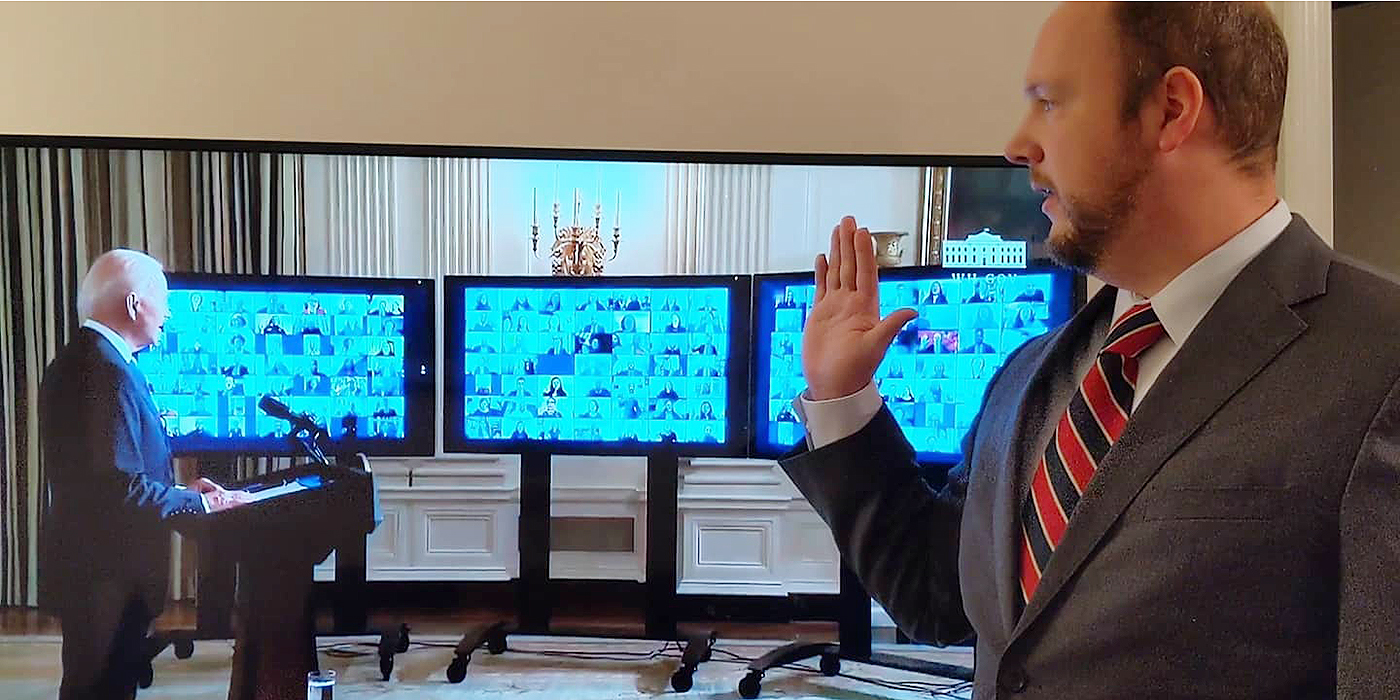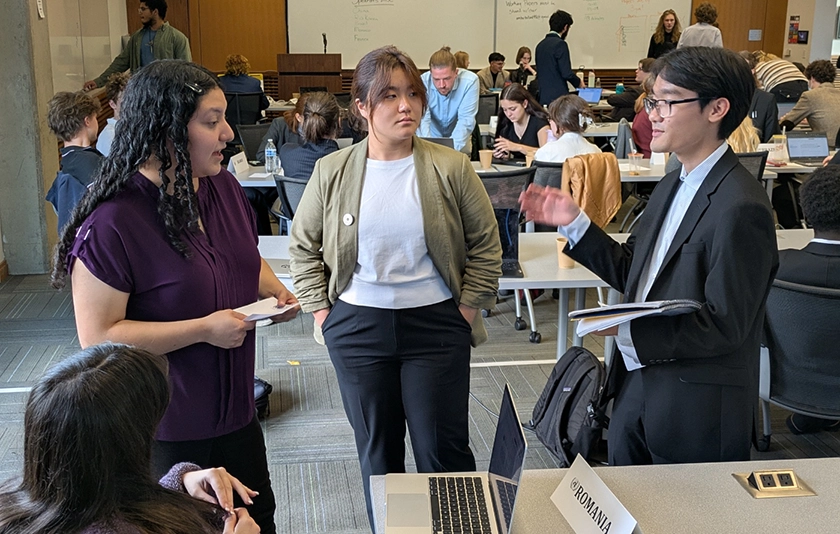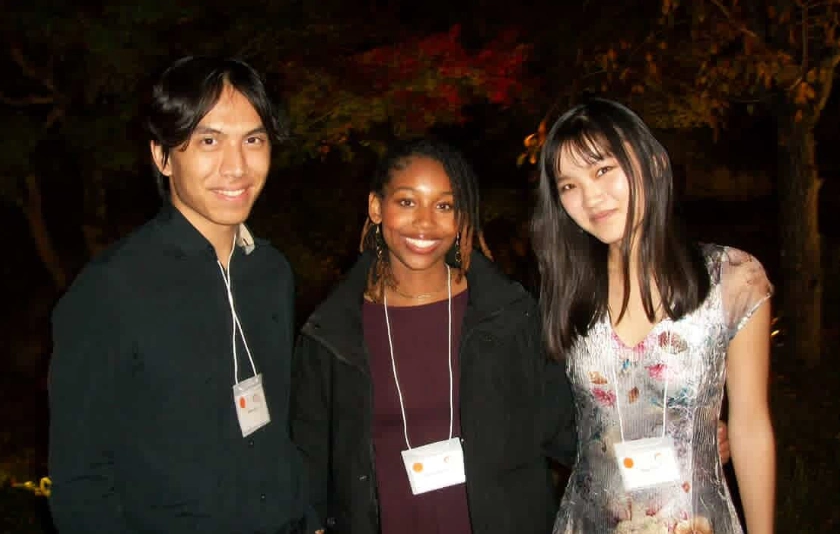Steam was rising from the hood of Edward McGlone’s truck when he received the call of a lifetime.
McGlone ’11 — the former director of Pacific Northwest policy for the House Committee on Transportation and Infrastructure in Washington, D.C. — was driving to his parents’ house in Salem on a Sunday in December when his vehicle broke down. When he pulled over, he noticed he’d missed a call.
For the past few weeks, he’d anxiously been awaiting word on his application for deputy assistant secretary at the U.S. Department of Transportation, a position appointed by President Joe Biden.
Realizing the administration’s transition team had called, he assumed they wouldn’t contact him on a Sunday if he hadn’t gotten the job. From the side of the road, he excitedly called back. He was right.
The gravity of the moment didn’t sink in immediately, however.
“Frankly, I was more concerned about whether or not my truck would make it from Eugene to Salem,” he said.
On Jan. 21 at 3:30 p.m., McGlone raised his right hand as he joined 45 appointees being sworn in to work for the highest office in the land.
Early start in politics
McGlone’s path to the administration began with Oregon State Treasurer Tobias Read ’97.
McGlone first met Read at his parents’ doorstep in 2006. Read was campaigning for state representative when McGlone, who previously volunteered for campaigns, asked if Read wanted help. After Read won the House seat, he offered McGlone a job. At age 17, he wasn’t old enough to vote but he was working at the Oregon State Capitol, he said.
At Willamette, professors supported his part-time schedule, allowing him to attend hearings while balancing classes for his politics major because they understood his commitment to public service.
The university’s motto, “Not unto ourselves alone are we born,” came to bear there, he said.
“As part of our liberal arts education, we were being trained to consider a broader world view and take into account both our privileges and our responsibilities,” he said. “Having that educational foundation as a backdrop to a public service job provided a different framework to view the work.”
One of Read’s duties was serving as chair of the House Committee on Transportation and Economic Development, which exposed McGlone more closely to an issue long important to him: public transportation.
“It’s the great equalizer,” he said. “When you’re riding a subway in New York City, you could be riding next to a Fortune 500 CEO or someone who just immigrated and cleans houses for a living. It’s the only circumstance where you’re sitting next to each other as equals, and I think that’s really powerful.”
After he graduated, McGlone landed a job as a government affairs analyst at TriMet in Portland, the largest transit agency in the state, then a position at Lane Transit District in Eugene, moving up the ranks to director of public affairs. Most recently, McGlone worked for Congressman Peter DeFazio, chair of the House Committee on Transportation and Infrastructure.
Expanded responsibilities
McGlone’s role marks a dramatic shift.
As deputy assistant secretary of congressional affairs, he makes sure the values of the administration and Secretary of Transportation Pete Buttigieg are reflected in meaningful policy, and his reach is much broader than before. Instead of working mostly with House members, he now serves all members of Congress who represent the hundreds of millions of Americans who use some form of transportation and all that accompanies it — roads, bridges, buses, rail, canals and planes — on a daily basis.
Following Biden’s effort to address the pandemic and economic fallout, McGlone was immediately involved with the USDOT’s piece of Biden’s proposed $1.9 trillion American Rescue Plan, making sure funding levels can support public transit for essential workers.
Advancing to such a heightened role during the pandemic is “in many ways momentous, and in many ways unnoticeable,” he said.
“Normally if you change jobs, you change offices — you say goodbye to your coworkers, there’s a party. In this instance, a FedEx package arrived with a laptop and instructions,” he laughed. “The desk and chair at which I sat for my old job is the same desk and chair I’ll use for the new one.” At the swearing-in ceremony, he wore a suit and tie in his living room.
But on the evening of inauguration, Biden held a virtual ceremony for the political appointees, speaking at length about his expectations for employees and the values they represent while working for the American public. McGlone grew a little emotional.
“The president didn’t have to do that, and I don’t think he normally does,” he said. “It was an opportunity for the administration to make the best of a joyous, ceremonial moment that’s normally replete with pomp and circumstance.”
Ahead for McGlone will be some timely conversations on climate change and ways to better incorporate racial justice and equity into the broader transportation system. He enjoys the pressure and the challenge, he says.
“It’s kind of like being invited by Michael Jordan to play on the dream team,” he said. “Every colleague of yours is at the top of their field. To be surrounded by this level of exceptional talent, pulled from all over the country, with everyone united in a common purpose — that’s really fun and invigorating.”



